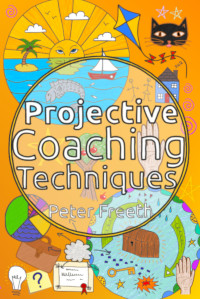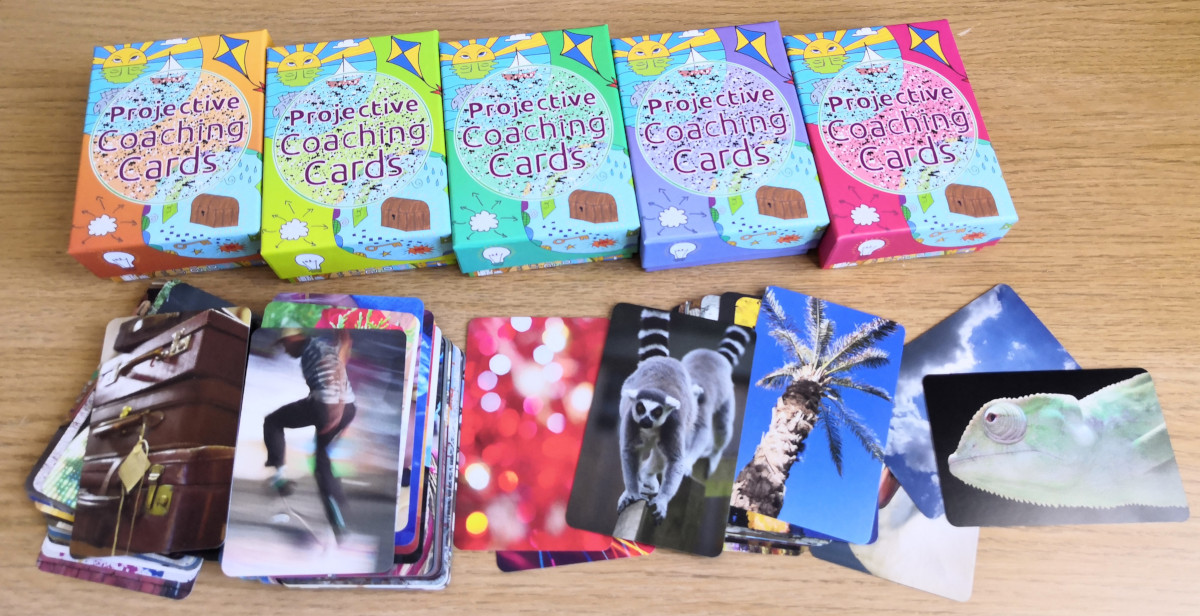Projective Coaching is an insightful, exciting and dynamic way to deeply explore your client's reality, dreams, hopes and fears. It is expansive, gently challenging and incredibly revealing. The Certified Projective Coach Program will reveal to you a set of powerful projective tools to use to take your coaching into a new dimension, transforming your work, your clients and your self.
If, as a coach, you limit yourself to cognitively questioning your clients then you are missing a significant opportunity to interact in a way which transcends words, and you are denying your clients the opportunity to express themselves, free from the vocabulary which they are able or willing to use. By exploring these, and other projective techniques, you open up a whole new avenue of exploration and expression, and free yourself and your clients to truly explore the world of their dreams.

If you are a coach, or a mentor, or even a manager or parent, you'll know that people don't always tell you the whole story.
Sometimes, they can't put their inner experience into words. Sometimes, they can't even get a handle on the confusing and conflicting realities that they're trying to resolve. Sometimes, they don't want to share what's really going on, and sometimes, they are more concerned with how they look to you, and how their story makes them sound.
This is a common problem in coaching, where the client wants to give an impression, or please their coach with their progress, or play down the truth of their current situation. Sometimes, the client doesn't want to take responsibility or admit that where they are isn't all the fault of other people after all. Maybe they even had a choice in getting to where they are.
The way that your client portrays their reality is analogous to a map. They give you a map, and from that, you have to help them navigate to where they want to be. But as with any map, you can only navigate if the map bears a meaningful relationship with reality. Any map is a symbolic representation of reality, and you have to be able to make sense of the symbols.
All of these possibilities and challenges can be addressed with a style of coaching which I call 'projective coaching'. Simply, the coach creates a blank canvas onto which the client projects a map of their reality, without trying to make it look good, without trying to make it sound right, without trying to make any sense of it at all. Together, the coach and client then explore the map and its symbols in order to deduce the deeper meanings and relationships which, otherwise, are lost in the noise of the client's story.
Examples of Projective Techniques
Projective coaching can take countless forms. It can be artistic, linguistic, physical, relational, abstract, literal. Almost any commonplace coaching activity can be converted into a projective exercise with a little creativity on the part of the coach.
You may already be familiar with my creative problem solving tool The Unsticker (www.theunsticker.com) which is another type of projective tool, in that the client makes sense of the random questions by projecting their own meaning into them.
The Untangler is a wonderful coaching tool which enables the client to physically interact with all of the various strands of their complex issue, gradually teasing out the insights and distinctions which give them absolute clarity. The key is that, although the cards bear words describing aspects of the issue, the words on the cards are not particularly important. The physical, spatial relationships are what causes the complexity, and awareness of these relationships is also what brings the insight and clarity. The end result is a sudden burst of energy, a tangible release of tension and a sense of peace, calm and absolute resolve about the issue in question.
The mandala is a drawing exercise, using colours and shapes as a set of abstract symbols. It has three distinct phases; expressing, interpreting and synthesising. The results and insights that people get from this are astonishing, surprising, revealing, and often obvious, in a non-obvious way. People often comment that they had no idea how a subject that they thought was deeply hidden away was actually so close to the surface, influencing their daily actions in ways they hadn't understood before.
Types of Projective Techniques
Projective techniques are often divided into five groups. (Linzey, G. (1959). On the classification of projective techniques. Psychological Bulletin, 56(2), 158–168.)
Associative techniques in which a particular stimulus is used to elicit the first thing that occurs in the client’s mind. The set of symbols and colours that you recently saw in this book were examples of associative techniques, and the Rorschach test is perhaps the most well-known.
Completion techniques in which the client completes sentences or drawings, perhaps adding an ending or caption.
Constructive techniques in which the client creates a drawing, sculpture or story with minimal initial framing. The Mandala which you will read about later in this book is an example of a constructive techniques, although the initial setup script and the use of the circle do offer a frame of reference for the client.
Ordering techniques in which the client chooses from a group, or puts a group of pictures, statements or other fragments of information into a particular order.
Expressive techniques in which the client organises and incorporates a particular stimulus into a self-expressive process, such as role playing or an improvised story.
Relational techniques are a sixth group that I would add, in which the client organises a set of elements in a two or three dimensional space. This group would include the Three Circles and the Untangler which you’ll read about later in this book, as well as constellation techniques as pioneered by Virginia Satir. I think that this is a distinct group from ordering, because such one dimensional techniques are about prioritising, which does not explain the complex interactions between elements in multiple dimensions.
Included in the Certified Projective Coach Program fee is a copy of the book Projective Coaching Techniques, and the full 5 sets of Projective Coaching Cards to get you started on your exciting new coaching journey.


Certification
The 3 day certification training will give you a set of projective tools, plus a thorough understanding of the principles behind them so that you can adapt and improvise for your own unique client relationships. The fee for the full program is £995.
The Certified Projective Coach Program is certified by INCA.

